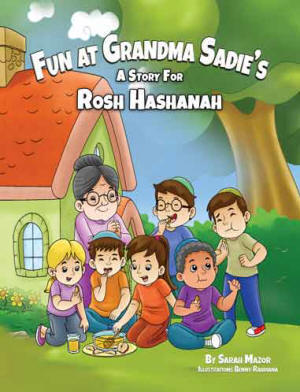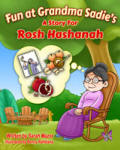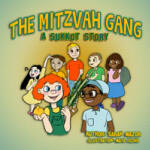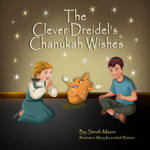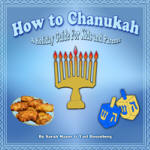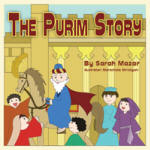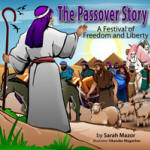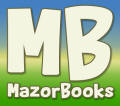
|
| • Holiday Gifts |
| Holiday Central > Rosh Hashanah > Prayers |
By: Rivka C. Berman, Contributor
Click Here for More Holiday Articles

|
CHILDREN'S BOOK for AGES 5-11 |
Special
Prayers for a Special Holiday
So many prayers are unique to Rosh Hashanah that the holiday has its own
prayer book known as a machzor. Machzor is related to the Hebrew word
for review. This may refer to the need to have a text in order to review
the prayers that are only said once a year unlike the familiar everyday
prayers that some could say by heart.
Pray and Say It Like You Mean It
In his witty and wise Rosh Hashanah and Yom Kippur Survival Kit
(Leviathan Press 1992) author Shimon Apisdorf offers several tips for
making prayer more meaningful. He notes that the machzor is long and the
time to say each prayer is relatively short. Thoughtful prayer, even if
only a few lines are said, is more meaningful than fast paced mumbling.
Furthermore, God understands every language not just Hebrew. It’s okay
if intense moments of prayer come and go throughout the service.
Expecting an ongoing earth-shattering spiritual epiphany to last
throughout the whole service unrealistic for even the most devoted
synagogue member.
Highlights of the Rosh Hashanah Service
- Hamelech - The Sovereign
- Avinu Malkeinu
- Amida - The Silent Devotion
- Malchuyot - Sovereignty
- Zichronot - Rememberance
- Shofarot - The Power of the Shofar
- Unetaneh Tokef - Let Us Examine the Power of the Day
Hamelech – The Sovereign
“Hamelech Hayoshaiv Al Keesay Ram V’neesa,” the King who sits on a high
and lofty throne! This line in the morning service turns the cantors who
recite it into royal pages, sounding the trumpets! Welcoming with great
flourish, trilling their voices and soaring through this turning point
in the day’s prayers.
Astronomers describe our galaxy as a speck among thousands or millions
of others. Our home planet, Earth, is a blue dot among brilliant stars,
planets, and satellites. Humans are a splinter among the forests and
jungles of creatures. Yet God is a Ruler who cares enough to sit in
judgement of our puny deeds. To see God as Sovereign is to have God
present and involved in the lives of all.
Avinu Malkeinu
This prayer lists requests directed to God who plays the dual role of
Avinu Malkeinu Our Parent, Our Sovereign, or a closer translation that
is less egalitarian, Our Father, Our King. God is acknowledged as both
Ruler, who sets the standards, and Parent, who loves the child no matter
how wayward.
On Rosh Hashanah, when all deeds are recalled, we appeal to God as
merciful Parent. It’s a soothing notion for those whose prayers appear
to have gone unanswered. Like a good parent, God doesn’t hand out every
requested goodie, only those which are ultimately good for us.
Amida - The Silent Devotion
The Amida is recited in all three daily services (Shacharit - morning,
Mincha - afternoon, and Arvit -evening). On Shabbat and holidays, Musaf,
meaning additional, is added.
Rosh Hashanah’s Musaf has the distinction of the Amida that is the
granddaddy of them all, the year’s longest Amida. Aside from the usual
blessings found in every Amida, the Musaf prayer is stocked with three
extra sections: Malkhu-yot, proclaiming God’s sovereignty; Zichronot,
examining God’s power to recall and review the past; and Shofrot,
relaying the times throughout history that God’s presence was signaled
by the sounding of the shofar.
Malchuyot – Sovereignty
God as Sovereign and humankind’s role in God’s coronation recur
throughout the Rosh Hashanah liturgy.
God as Rule-maker. Judaism offers rules for living. Guidelines can
appear restricting, but not being enslaved to ego, base whims, and
drives offers those who follow these rules the freedom to live inspired.
While asserting loyalty to God, the Ultimate Sovereign, there is time to
reflect on where personal loyalties lie. Who is given priority? family?
friends? country?
Zichronot – Remembrance
“By the way God, while You’re remembering all the things I did or didn’t
do over the past year, please turn the ledger of Life back a few
chapters to the holiness of Abraham and Sarah, Isaac and Rebecca, Jacob,
Leah and Rachel. Credit me with a good year – if only because my
ancestors were so extraordinary.”
Zichronot is the section when this sort of plea is made. Noah and his
family were saved because of their righteousness, save us. Covenants
were made with the forefathers and foremothers of the Jewish People, may
their greatness and commitment stand in good stead for their
descendants.
Amid all the jogging of God’s memory take some time out to look at your
personal remembrances. What is it that you remember? Do you remember the
good others have done for you or does your memory hold more grudges than
good graces? Do you remember to keep your promises? Do you recall the
pledges to be a better person once the danger has passed or do
resolutions evaporate in good times?
Shofrot – The Power of the Shofar
God breathed a soul into Adam. The Sturm und Drang of life echo over the
still, small voice of the soul. On Rosh Hashanah the soul-breath is
final heard when amplified by the shofar horn. What does the soul say?
It cries.
Shofrot is the part of the Amida that recall the numerous notable roles
played by the shofar. The shofar sounded at Sinai to announce God’s
presence. The shofar will sound to end the Jewish exile and calling this
scattered battered nation to reunify and revel in peace. Other passages
mentioned in the Shofrot section establish a pattern: when a shofar
sounds there is a heightened awareness of God’s presence.
Commentators, Maimonides most prominent among them, have suggested that
the shofar is a wakeup call. Shofrot verses may be interpreted as an
attempt to answer the question: “Wake up to what?” Over 2000 years ago,
at Sinai the verse recall that God’s presence was so real it set the
Israelites shaking in their sandals. Arise and awaken to the Godliness
around and within.
U’netaneh Tokef – Let us Examine the Power of the Day
This prayer has a haunting history. According to Rabbi Eliyahu Kitov, in
his encyclopedic Book of Our Heritage, there was once a Rabbi Amnon, a
community leader, who was subject to many proselytizing attempts by the
local Church officials. Well-to-do and good-looking, Rabbi Amnon was a
prize catch. Relentless as the authorities were in their mission, Rabbi
Amnon rebuffed their pitch until he gave the fatigued answer “Give me
three days to think about it.”
Expressing this whit of doubt so plagued Rabbi Amnon that he refused to
eat or drink. Day three arrived and the guards called Rabbi Amnon to
appear and give his answer. He proclaimed his fidelity to Judaism. At
the official’s command Rabbi Amnon was punished with a slow
dismemberment. How devoted are you to Judaism? Do you know enough about
being Jewish to understand why Rabbi Amnon and millions of Jews like him
made the ultimate sacrifice for their faith?
Wounded and suffering Rabbi Amnon asked to be taken to the synagogue for
one last Rosh Hashanah service. He interrupted the prayers and recited
the devotion now known as U’netaneh Tokaif. The short prayer paints one
of the most enduring and powerful images of Rosh Hashanah. On this day,
God is a Shepherd counting the flock one by one and deciding the fate of
each. “Who will live? Who will die?”
A reassurance closes this powerful prayer: “Repentance, Prayer, and
Charity can remove the sever decree.”

Mazor Guide to Rosh Hashanah brings you much more about the holiday, its meaning and its traditions... See the links below.
- Rosh Hashanah Home Page
- Rosh Hashanah for Jews Without a Prayer
- What Does Rosh Hashanah Celebrate?
- Rosh Hashanah Customs
- Symbolic Foods
- The Shofar Blasts!
- Candle Lighting & Blessing
- Special Prayers for a Special Holiday
- Torah Reading for Rosh Hashanah
- Tashlich
- Rosh Hashanah Shopping
.jpg)
Buy Kosher Wines for Rosh Hashanah!!
Articles
- Preparing for the Court Case by Daniel Hadar
|
|
|
|

|
| • Holiday Gifts |
|
|
 |
| • Celebrations Gifts |
|
·
Wedding Gifts · Bar Mitzvah Gifts · Baby Gifts · Jewish Books at Great Prices |
KOSHER BY DESIGN Amazing New Kosher Cookbook. BUY |
Mazor Guides: Wealth of Information and Resources
- Mazor Guide - The Ultimate Guide to
Living Jewish -
- Guide to Jewish
Holidays -
-
Bar Mitzvah
and Bat Mitzvah Guide -
-
Guide to a
Jewish Wedding -
-
Guide to Jewish Celebrations -
-
Guide to Kosher Living -
- Infertility and
Judaism: A Guide -
- The Get (Gett)
- the Jewish Divorce: A Guide -
- Zei
Gezunt: Jewish Perspective on Health -
- Jewish Genetic Diseases -
-
Death and Mourning in
Judaism -
Copyright 1998-2024 MazorNet, Inc.
| http://www.MazorGuide.com | http://www.MazorBooks.com | http://www.Kosher-Directory.com | http://www.JewishCelebrations.com




